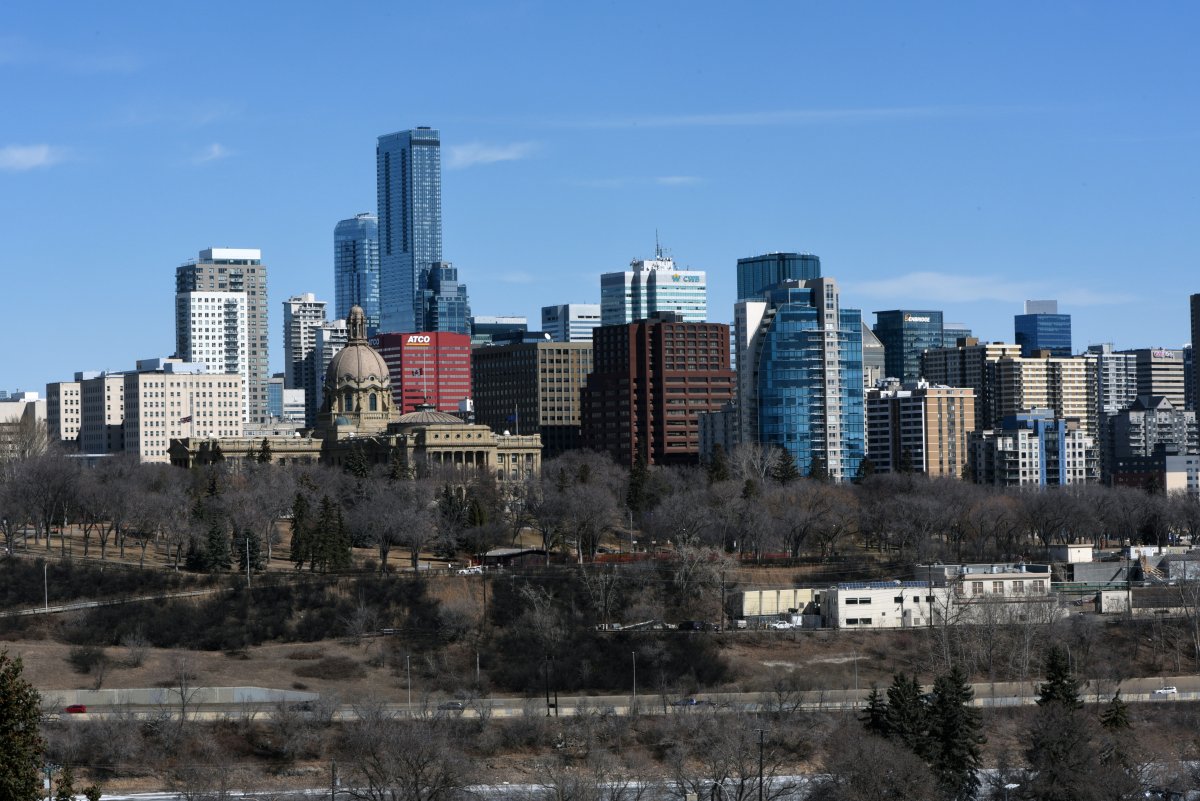Both the city and province are promising to continue work to make Edmonton’s downtown and surrounding areas safe.

This comes as business communities and residents in the area report they still don’t feel safe walking through the core.
“I’m not scared, I just feel really vulnerable right now walking past people,” Hifa Maleki told Global News.
She’s a restaurateur who has worked downtown for decades.
Moments prior to speaking with Global News, she says she had an encounter which made her feel unsafe.
“There was someone that was, we’ll say, intoxicated, just following quickly after myself and my friend. You kind of have to pick up your pace a little bit, so it doesn’t necessarily feel as safe or inviting to walk the streets even in the daylight.”

Maleki noted how when she previously worked downtown, beat cops would check in with businesses at the end of each day.
She believes an increased police presence could help.
“It would make me feel safer because it would probably just naturally deter some of that sketchiness going on,” she explained.
Her sentiment is shared by Alberta’s public safety minister, Mike Ellis.
“Sometimes we have to boil down to the basics and the basics mean officer presence,” Ellis told Global News in a one-on-one interview.
“It’s not about the handcuffs. It’s about making sure people in this neighbourhood know there’s somebody to turn to if there is a problem.”
He calls downtown safety a complex issue with no single solution.

“We can talk about the statistics and we can talk about the programs… but that doesn’t take away from the fact that people are still not feeling safe and we have to address that.”
Ellis notes the province has provided increased funding for more police officers, provided mental health and addictions supports, and has launched a pilot project which see’s a dozen officers embedded into the Edmonton Police Service and another dozen embedded into the Calgary Police Service.
“They’ve yielded some very positive results and that officer presence has been making a difference.”
Calgary has opted out of the project, while Edmonton has extended their partnership an additional ten months, continuing to December.
“I’m very proud and pleased to see that Edmonton has continued with that relationship,” Ellis added.

For businesses, they say they’re trying to keep up and turn things around in downtown Edmonton and surrounding areas.
“If you feel you were unsafe when you came to downtown your last visit, you probably were, I’m not here to convince you others,” Stephen Hammerschmidt with the Chinatown and Area Business Improvement Association (BIA) told Global News.
“What I’m saying is we’ve resolved the lion’s share of our issues. Come down at a safer time — a lunch time — take a walk around, and see how you feel.”
While most BIAs focus on community events and driving more business to their communities, Hammerschmidt has an extra task in his job. He’s helping coordinate efforts to clean-up the area of drugs and disorder in efforts to revitalize Chinatown.
“If this were a problem we could just throw money at, this problem would’ve been solved five years ago. That doesn’t work, we have to roll up our sleeves and get actively involved,” he said.

The BIA started its long-term ‘Chinatown Solution’ project about four months ago. They met Thursday night for an update.
In efforts to clean-up Chinatown, dozens of people from Hope Mission’s recovery program have been hired to clean store windows and wash sidewalks on a bi-weekly basis.
“This is bringing Chinatown up to snuff. It’s clean, it’s safe,” he said.
“I think as people learn to trust Chinatown is safe again by experiencing it, then they will come back more often.”

“We’ve now entered into another agreement with a not-for-profit here in Edmonton that hires on disabled skilled trades and they are fixing all of our fences,” Hammerschmidt said.
“A lot of this is optics. When you go into a neighbourhood and you see a fence that’s been cut and kicked down, you know you’re in the wrong neighbourhood. So, this has all been resolved.”
The BIA also launched an initiative which sees four $40,000 bursaries granted to businesses looking to open in the area. Hammerschmidt said eight have applied.
In a statement to Global News, Mayor Amarjeet Sohi said he’s committed to improving safety in Edmonton.
“We’ve done this by hiring new transit peace officers, social workers, stabilizing and increasing police funding, by opening up the Healthy Streets Operation Centre, installing public washrooms and funding 24/7 crisis diversion and interdisciplinary teams,” his statement read.
“We know that we still have work to do to improve safety because when anyone feels unsafe, that is one person too many. We look forward to working with the newly elected provincial government on this shared responsibility.”
- B.C. Sikh leader ‘vindicated’ by arrest of Indian nationals in Nijjar killing
- London Drugs remains closed, says it is reviewing billions of lines of data
- How toy guns brandished by Ontario youth in ‘assassins game’ is prompting real fear
- Trump trial hears recording discussing hush money scheme: ‘What do we got to pay?’




Comments